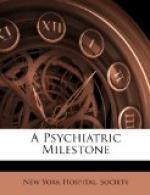A second phase of great importance is that institutions like Bloomingdale have promoted the study of psychology far more than any other factor, particularly because in them the personality stripped of some of its intricacies, the diseased personality, permits analysis, which the normal complex has so long defied. That it is high time that mankind was undertaking this knowledge of himself is particularly emphasized by the unrest and aberrance of human behavior now startling and disturbing the whole world. If mankind does not take up this self study as Trotter has said, Nature may tire of her experiment man, that complex multicellular gregarious animal who is unable to protect himself even from a simple unicellular organism, and may sweep him from her work-table to make room for one more effort of her tireless and patient curiosity. Psychology should be taught to every doctor and to every lettered man.
Digressing for a moment, to every one capable of understanding it, there should be imparted a knowledge of that simple economic law announced from the Garden of Eden after the grounds had been cleared and the gates closed: “By the sweat of thy brow thou shalt earn thy bread.” The economic phase indeed constitutes a highly important aspect of modern psychology, for abnormal elements are antisocial, and from pickpockets to anarchists flourish on the soil of pauperism. The key-note of the future is responsibility. To the educated and enlightened man who still asks, “Am I my brother’s keeper?” Cain has bequeathed a drop of his fratricidal blood; and he who spurns to do his share of the world’s work, electing instead to fall a burden upon the community, deserves the fate of the barren fig-tree.
However, amidst the social unrest, buffeted and perplexed by the cross currents of our time, we should not be pessimistic but should look forward with courage, parting reluctantly with whatever of good the past contained and living hopefully in the present. As Ellis says: “The present is in every age merely the shifting point at which past and future meet, and we can have no quarrel with either. There can be no world without traditions; neither can there be any life without movement. As Heraclitus knew at the outset of modern philosophy, we cannot bathe twice in the same stream, though as we know to-day, the stream still flows in an unending circle. There is never a moment when the new dawn is not breaking over the earth, and never a moment when the sunset ceases to die. It is well to greet serenely even the first glimmer of the dawn when we see it, not hastening toward it with undue speed, nor leaving the sunset without gratitude for the dying light that once was dawn.”
So to-day I bring to you from the New York Academy of Medicine felicitations on your one hundredth anniversary and greetings to your guests who have come from all over the world to join in your birthday celebration.




